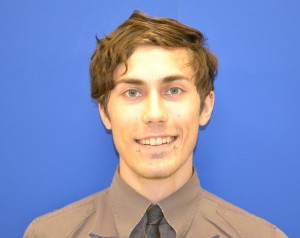 Alexander Morrow is a Sophomore majoring in Computer Science.
Alexander Morrow is a Sophomore majoring in Computer Science.
What sort of research are you doing? I am exploring predictive model uncertainty. Predictive models are tools that, given some attributes of an instance, attempt to predict what class it belongs to. For example, if a model analyzed weather data and discovered that every day during Spring with high humidity was a rainy day, then when another day that has similar qualities was encountered the model would classify that day as being most likely a rainy day as well. However, with complex data, a model often makes incorrect classifications. This can occur, for example, if the model had only encountered one day in which it was warm during the winter. When it encounters another warm day during the winter, the model may believe it is certainly the last one. In reality there is not enough information to be confident. We are exploring various ways in which the data can be presented visually so that the best insight can be gained into where and why the model is uncertain for a particular domain. We are also attempting to rescale the predictions of the model in an attempt to give more accurate measurements of confidence throughout the model's predictions.
How long have you been doing this research? What inspired you to become involved/ how did you become involved? I have been attending the MAPLE lab meetings since my first week at UMBC and I have been doing research since the second semester of my freshman year, including a summer position over the most recent break.
I have known that I wanted to be involved in research since I was young. I love exploring, and the concept of attempting to find solutions to problems that have not yet been solved has always been attractive to me. I believe machine learning has a lot to offer to mankind. Machine learning enables us to discover trends and reveal truths that we might not otherwise see. There are many problems we face which may be difficult or impossible for us to fully understand because of their complexity. Computers that can learn in unfamiliar situations and create new ideas and concepts would allow us to understand and solve these problems, as well as provide insight into the nature of our own minds.
Is this your first research project? Yes.
How much time do you spend doing research? As much as I can! Sometimes this means close to a full time job, and sometimes this means very little time, such as during finals week. I usually pick a few goals every week and aim to have them accomplished. If I have extra time, perhaps I will push a little further or make sure everything is working correctly.
Are you collaborating with any other students or faculty members? Yes, the project is led by Professor desJardins and Professor Rheingans, so I work closely with both of them. I also work alongside a few other students.
What is the best part of your research so far? The best part of my research so far is how much I am learning. Prior to attending UMBC, I read about concepts in machine learning, but I never had any hands on experience with them. Although I have learned much in my classes, my involvement with the MAPLE lab constantly challenges me to teach myself about something I will spend my life doing.
What is the biggest obstacle you have faced while doing research so far? The biggest obstacle I have faced with research at UMBC is the work from the classes I am in. Sometimes I am not able to be as dedicated as I would like to research because of my other obligations.
What do you hope to achieve with this research? In addition to gaining general experience about the processes and work involved in academic research, I hope to learn about research topics specifically within the field of machine learning so that I can refine my interests and eventually decide what I would really like to focus on in my future work.
Do you feel like this research is preparing you for post-college plans? Definitely. As my current plans involve research and machine learning, the current research I am involved with promotes my post-college plans directly. Even if my plans change, I believe I am much more experienced and well educated as a result of my involvement.
What are your plans after graduation? After graduation I plan to apply to graduate school.
To learn more about Alexander's research project, visit the the project website.
*Alexander was interviewed in September 2011.